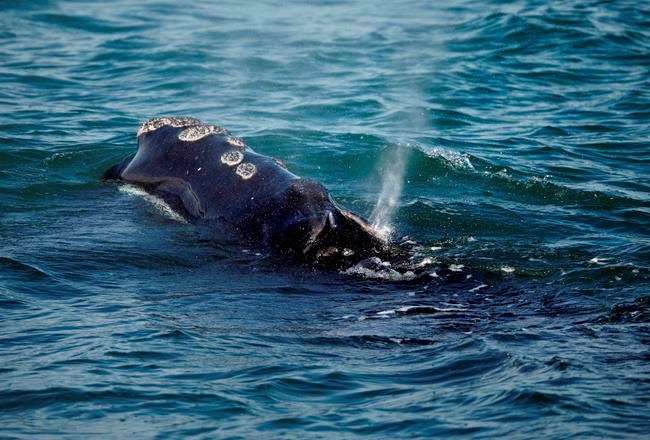FREDERICTON — The federal Fisheries Department will continue efforts this year to protect endangered North Atlantic right whales in Canadian waters, but it is making some changes to reduce the impact on the fishing industry.
The government announced Thursday it will still close fishing areas when whales are present, but before prolonging such a closure, authorities plan to step up surveillance to determine whether the whales remain.
When a right whale is detected in an area, it is closed to lobster and crab fishers for 15 days. Starting this year, a whale would have to be detected again between the ninth and 15th day for that closure to be extended.
The news was welcomed by Jean Lanteigne, general manager of the Federation Regionale Acadienne, which represents crab fishermen in northeastern New Brunswick. "It is good news," Lanteigne said in an interview. "I think our argument has been heard by the department."
Lanteigne said it didn't make sense to close an area for the entire season if the whales were just briefly passing through. "We can now follow the path of the whales more closely. It is our fourth year of observation and we have a better understanding of where they want to go," he said.
"The fishing season is short. It is basically eight to 10 weeks, so if you close for 15 days, that's already a long time," Lanteigne added.
In the Bay of Fundy and the Roseway and Grand Manan basins, if a whale is detected during days nine to 15, the area will be closed for an additional 15 days. But in the Gulf of St. Lawrence, a second such sighting will result in a season-long closure.
Again this year, the government's monitoring program will include multiple aircraft, a drone, on-the-water vessel surveillance and underwater hydrophones.
Tonya Wimmer, director of conservation group Marine Animal Response Society, said the government's new strategy hasn't changed much from last year.
"It allows a bit of risk, but with what we've seen in the data over the last year or so, hopefully we'll be OK, and it provides a bit of relief for the industry to be able to keep fishing," Wimmer said in an interview Thursday.
There were no North Atlantic right whale deaths or entanglements in fishing gear in Canadian waters in 2020, but in the previous five years, 25 deaths were recorded. It is estimated there are only 366 of the animals remaining in the world.
"Last season is proof that by working together, we can effectively protect North Atlantic right whales, while also continuing to put high-quality, sustainable seafood on dinner plates in Canada and around the world," Fisheries Minister Bernadette Jordan said in a statement Thursday.
Two whale calves have been reported dead in Florida so far this year, including one last Saturday that washed ashore on a beach near St. Augustine.
Wimmer said that leaves about 14 calves that will hopefully migrate north this year.
Restrictions on ship speeds will remain in place throughout much of the Gulf of St. Lawrence, while fishing vessels will have an exemption in waters less than 20 fathoms, or 37 metres, deep.
The mandatory speed limit in the Gulf of St. Lawrence is 10 knots, or about 19 kilometres per hour, beginning April 28.
The same 10-knot limit will be in place for boats travelling through the Cabot Strait from April 28 to June 29 and again from Sept. 29 to Nov. 15 to protect right whales migrating in and out of the Gulf of St. Lawrence. That measure is a voluntary trial.
The campaign director for Oceana Canada said she was hoping the government's strategy to protect the whales would have been improved this year.
"These are critically endangered whales on the edge of extinction — we do need to do everything we can to prevent human-caused deaths," Kim Elmslie said in a statement Thursday. She said the voluntary measure in the Cabot Strait should be mandatory and season-long.
Testing of new fishing gear that would allow whales to break free in the event of entanglement has been delayed by the COVID-19 pandemic, so a requirement for the new gear is postponed until the end of 2022.
"We are just beginning to test it," Lanteigne said. He said the ropes they are testing would snap after a pressure of 1,700 pounds was exerted on it. He said that is reasonable for lobster fishermen but may be too light for crab fishermen if they are pulling in loaded crab pots in strong currents.
If the line was to break, it would be a loss to the fishermen and result in stranded gear that could be a hazard for the whales, he said.
The government is also expanding its consultation, and a technical working group of harvesters, right whale experts and department staff will meet throughout the year. An annual roundtable meeting takes place each November.
This report by The Canadian Press was first published Feb. 18, 2021.
Kevin Bissett, The Canadian Press



